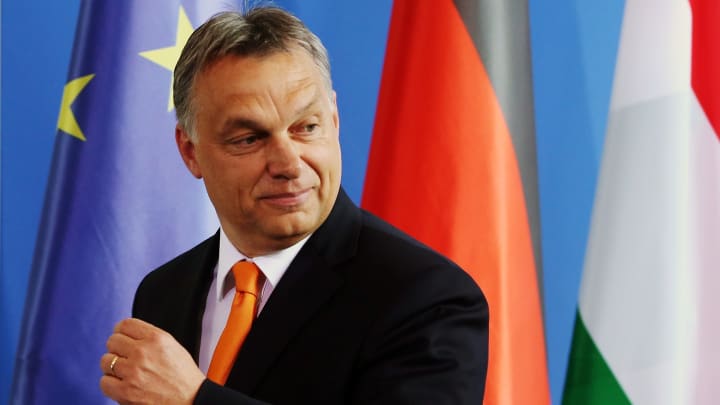The Unaccounted For Side Effect: Hungary's Fight for Freedom
How Democracies Die During A Global Pandemic

With over 500,000 infected cases and nearly 20,000 casualties and counting, COVID-19 (otherwise known as 'The Coronavirus') is becoming more infectious with the passing day. However, as viral panic for the disease continues to spread, there is another pathogen in the air. A pathogen so deadly that its effects on global society could last for years, if not decades.
And that pathogen is none other than the slow creep of autocracy amid our current global pandemic. Leaders across the globe have shown a wide array of responses to COVID-19, whether it be national shutdowns and quarantines in Italy, travel bans and social distancing in the US, or even the order to shoot infected individuals on sight in North Korea.
COVID-19 has tested governments in ways never before in modern society, which has consequently pushed some to their breaking point. An example of such is the prominent eastern European country, Hungary.
Politico Magazine explains in an article posted just over a week ago, how a 2/3rds majority vote in Parliament allowed Prime Minister, Viktor Orban to rule by decree. Essentially what this means is that Parliament, as of now, is suspended, the whims of the Executive can cancel specific laws and that Mr.Obran can rule in such a manner for an indefinite amount of time.
Initially, while two-thirds of Parliament may sound like a large number of people and a fair amount of representation for the Hungarian people, it sadly isn't. The Politico article furthers how only 137 members of Parliament voted in agreement for such powers to be granted, with nearly 57 in opposition and nine abstained.

It's important to realize that the main reason Mr. Orban was able to gain such sweeping powers in the first place. The voting result occurred mainly because the Parliament, already flawed by its rather small size, is mostly controlled by his right-wing party, Fidesz.
Furthermore, as stated by Budapest Beacon (a primary Hungarian publication), Mr. Orban has absolute loyalty from the President, the person whose signature is required to end said rule by decree. Thus this has allowed Orban to implement many policies, such as 5-year prison sentences for those he deems are guilty of spreading "fake news."
Now it is not uncommon in times of crisis for governments to exert more robust control over policy and daily functions; in fact, such efforts are often welcomed by both citizens and the international community as a whole.
However, the manner to which Viktor Orban has taken to the issue is nothing more than a poorly covered up attempt to attain more power for his long-term agenda. In order to fully understand the implications of Hungary's recent vote, we must first become familiar with Prime Minister Orban as both a politician and the face of a democratically struggling nation.
Foreign Affairs explains in their fall journal that Viktor Orban, despite being an emanate critic of the left, was once part of it himself. In his early years, Orban once studied at a Hungarian law school funded in large part by the leftist icon, George Soros. In fact, Orban even worked for him at one point in Soros' Open Society Foundation. It was there that Orban established his initial liberal political views and would later on in the 1990's go on to form the Fidesz party.
Ironically, Orban even went on to criticize the populist right-wing, at one point declaring that they "reject criticism of government policy by suggesting the opposition or media are undermining the standing of Hungary, are attacking the Hungarian nation itself."
The problem occurs when said ideology mutates into a cancerous right-wing rallying call that champions racism, perpetual inequality, and xenophobia, among other things.
Such words sound very ominous, seeing as decades later, Orban would become the very thing he sought to defeat. But that all leads to lurking question, why? How could such a vindictive, passionate, young politician turn into an old, embittered, tyrannical populist?
The answer lies within Orban's betrayal. Fidesz at the time had a testy alliance with the longstanding liberal parties, the foundation being their mutual opposition to the growing socialist and communist factions of government. However, in 1991, The Free Democrats (the pinnacle liberal party) broke said trust by forming a coalition with said sworn enemies, which resulted in Fidesz being the smallest party in Parliament.
It's no surprise that similar to the birth of the iconic Star Wars villain, Darth Vader, Orban, and his party abandoned their progressive values and fed into nationalistic fervor instead.
Now there is nothing wrong with conservative ideology; one can choose to favor middle-class values and more loose economic policies. The problem occurs when said ideology mutates into a cancerous right-wing rallying call that champions racism, perpetual inequality, and xenophobia, among other things.
Sadly, Orban's claim to fame dating back since 1998 has only increased these past two decades. His recent COVID-19 produced power grab only adds fuel to the fire. First, it allows him to enrich his patronage network.
Time Magazine explains how;
"the continent-wide crisis has already hit Hungary's tourism industry, one of the easiest sources of cash for Orban and his patronage network. That means more cash and contracts being awarded to the Hungarian companies with closest ties to Orban, one of the ways the emergency powers can come in handy.
Orban has spent years pushing out foreign firms (through legislation and taxes) not willing to play along with his game in favor of business partners more willing to do his bidding.
That's a localizing trend that will continue across sectors like retail, finance, and food processing—bad news for Hungary's consumers (who will have to pay more for goods that are cheaper to produce outside their country), but good news for Orban's network… at least for as long as it lasts."
Moreover, it's not just the economy that Hungary should be concerned about, but also how Orban's recent success will prove to be a shining example for aspiring populist nations. Take Poland, for example. NPR found out two months ago (before the pandemic became serious) that Poland was facing potential sanctions and loss of voting rights by the EU for its attempts to centralize its judicial system. Such threats delayed Poland's efforts but now may change due to Hungary's recent progress.
" the European Union appears toothless while American diplomacy is enabling, if not outright supportive of, Orbán."
Markos Kounalakis, a visiting fellow of the Hoover Institution and writer for the Miami Herald, reveals in a recent article how Orban has taken full control of the courts, dismantled watchdog institutions, and has subdued the media to his will in a matter of weeks. All the while, " the European Union appears toothless while American diplomacy is enabling, if not outright supportive of, Orbán."
The World Health Organization publicly announced that we are at war with COVID-19 and while yes, we must remain vigilant about global health at this time. We must also remember that while pandemics may have one, there is no vaccine for the rise of illiberal democracies.
Sources:
https://time.com/5815118/hungarys-viktor-orbans-eu/
https://www.miamiherald.com/article241763306.html
https://www.politico.com/news/2020/03/30/hungarys-viktor-orban-wins-vote-to-rule-by-decree-155476
https://www.kormany.hu/en/doc/the-hungarian-state/the-government-and-commissioners/the-government
https://budapestbeacon.com/president-ader-holds-fidesz-style-press-conference-budapest-high-school-students/
https://www.npr.org/sections/coronavirus-live-updates/2020/03/26/822123471/we-are-at-war-who-head-says-warning-millions-could-die-from-covid-19
https://www.npr.org/2020/02/13/805537071/eu-considers-sanctions-against-poland-for-overhauling-its-judiciary
About the Creator
Enjoyed the story? Support the Creator.
Subscribe for free to receive all their stories in your feed. You could also pledge your support or give them a one-off tip, letting them know you appreciate their work.






Comments
There are no comments for this story
Be the first to respond and start the conversation.